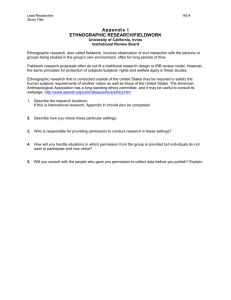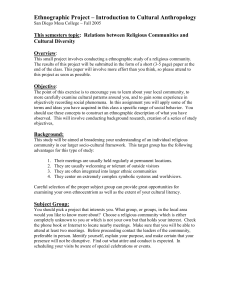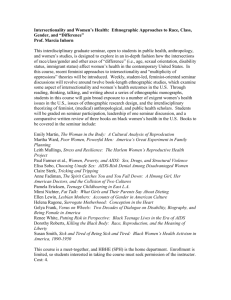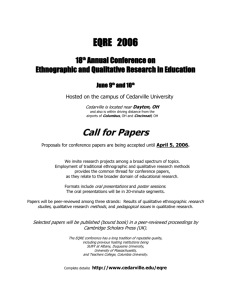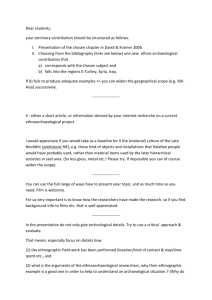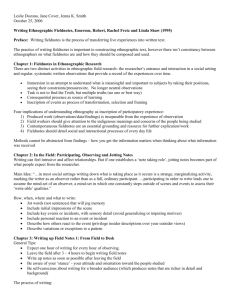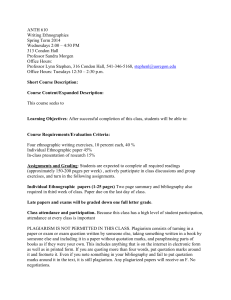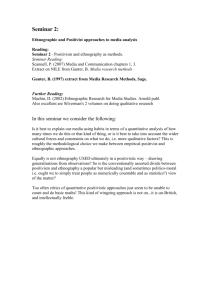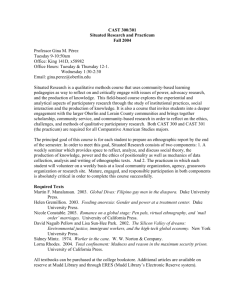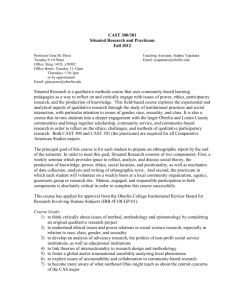CAST 300 - Oberlin College
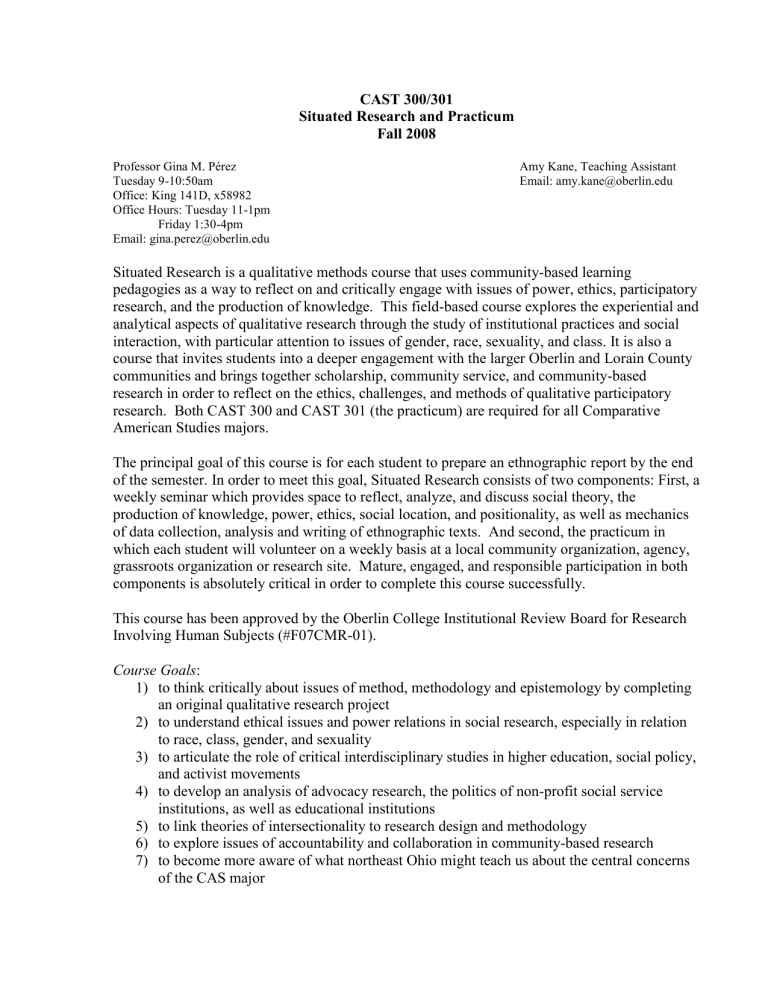
CAST 300/301
Situated Research and Practicum
Fall 2008
Amy Kane, Teaching Assistant
Email: amy.kane@oberlin.edu
Professor Gina M. Pérez
Tuesday 9-10:50am
Office: King 141D, x58982
Office Hours: Tuesday 11-1pm
Friday 1:30-4pm
Email: gina.perez@oberlin.edu
Situated Research is a qualitative methods course that uses community-based learning pedagogies as a way to reflect on and critically engage with issues of power, ethics, participatory research, and the production of knowledge. This field-based course explores the experiential and analytical aspects of qualitative research through the study of institutional practices and social interaction, with particular attention to issues of gender, race, sexuality, and class. It is also a course that invites students into a deeper engagement with the larger Oberlin and Lorain County communities and brings together scholarship, community service, and community-based research in order to reflect on the ethics, challenges, and methods of qualitative participatory research. Both CAST 300 and CAST 301 (the practicum) are required for all Comparative
American Studies majors.
The principal goal of this course is for each student to prepare an ethnographic report by the end of the semester. In order to meet this goal, Situated Research consists of two components: First, a weekly seminar which provides space to reflect, analyze, and discuss social theory, the production of knowledge, power, ethics, social location, and positionality, as well as mechanics of data collection, analysis and writing of ethnographic texts. And second, the practicum in which each student will volunteer on a weekly basis at a local community organization, agency, grassroots organization or research site. Mature, engaged, and responsible participation in both components is absolutely critical in order to complete this course successfully.
This course has been approved by the Oberlin College Institutional Review Board for Research
Involving Human Subjects (#F07CMR-01).
Course Goals :
1) to think critically about issues of method, methodology and epistemology by completing an original qualitative research project
2) to understand ethical issues and power relations in social research, especially in relation to race, class, gender, and sexuality
3) to articulate the role of critical interdisciplinary studies in higher education, social policy, and activist movements
4) to develop an analysis of advocacy research, the politics of non-profit social service institutions, as well as educational institutions
5) to link theories of intersectionality to research design and methodology
6) to explore issues of accountability and collaboration in community-based research
7) to become more aware of what northeast Ohio might teach us about the central concerns of the CAS major
Required Texts
Melissa Checker. 2005. Polluted Promises: Environmental Racism and the Search for Justice in a Southern Town. New York: New York University Press.
INCITE! Women of Color against Violence. 2007. The Revolution Will Not Be Funded: Beyond the Non-Profit Industrial Complex . Cambridge, MA: South End Press.
Alejandra Marchevsky and Jeanne Theoharis. 2006. Not Working: Latina Immigrants, Low-
Wage Jobs, and the Failure of Welfare Reform.
New York: New York University Press.
Reyna Ramirez. 2007. Native Hubs: Culture, Community, and Belonging in the Silicon Valley and Beyond . Durham: Duke University Press.
David Valentine. 2007. Imagining Transgender: An Ethnography of a Category.
Durham: Duke
University Press.
All textbooks can be purchased at the Oberlin College Bookstore. Additional articles are available on blackboard (BB).
COURSE REQUIREMENTS
Participation and Attendance: Students are expected to attend and participate in weekly seminars as well as in their chosen placement for the practicum. Given the myriad of ethical, political, and personal issues involved in doing qualitative research and working with community partners, it is absolutely essential for all students to engage each other respectfully. The relationships you build with community partners also involve establishing rapport, building trust, and mutual respect. Timely arrival, honest discussion, and respectful engagement are key to your success in the seminar and in your practicum placement.
P/NP: If you are taking this class P/NP, you must fulfill all course obligations to receive credit.
LATE WORK: All assignments must be completed on time. Papers not turned in at the specified time on the specified date will be considered late and will be penalized 1/3 grade for each day it is overdue. Late assignments will not receive written comments, and must include on the first page the date you turned in the assignment. On the rare occasion I agree to grant an extension on an assignment, you must include a note on the first page stating that you were granted an extension and the new due date. If you fail to do so, the assignment will be regarded as late and penalized accordingly.
ACADEMIC INCOMPLETES at the end of the semester will not be given except case of an emergency.
HONOR CODE: The policies described in the Oberlin College Honor Code apply to this class.
Written work must include proper citations and must be the product of your own work. You are also required to include the following statement on all written assignments: "I affirm that I have adhered to the Honor Code in this assignment." If you have any questions about how to cite sources properly or about the Honor Code, please feel free to approach me. For more information on the Honor Code, see http://www.oberlin.edu/students/links-life/rules-regs.html
2
STUDENTS NEEDING EXTRA ASSISTANCE: Please speak with me if you need disabilityrelated accommodations in this course. Student Academic Services is also an important resource for students needing academic assistance. Please contact Jane Boomer, Coordinator of Services for Students with Disabilities, Peters G27, extension 58467.
CAST 300/Research Seminar Assignments
Seminar participation and attendance
Situating field research assignments
Research project assignments
15%
20%
65%
I. Participation and Attendance in Research Seminars
Weekly seminars provide a space to share the experiences, challenges, concerns and joys of student placements and the research process. Discussing the ethics of research and disclosure is absolutely central to this course, and our first seminar meeting will be dedicated to discussing not only the ethics of research, but also to issues of confidentiality. Because each of you will bring reflections of your placements and of the people with whom you work into the classroom, as a class we will establish the seminar as a confidential space and stress that information, stories, concerns, and issues shared cannot be discussed outside of the seminar.
Weekly seminars will also include a discussion of assigned readings. The reading list will include articles discussing the ethics of research; issues of social stratification and hierarchies based on race, class, gender, sexuality; the challenges and importance of interdisciplinary and advocacy research; as well as a discussion of other methodologies, including feminist approaches, archival research, survey and content analysis. Course readings will also include ethnographies as a way to think through methodological questions and concerns students will face throughout their placement. An important course goal is for students to be able to identify various methods scholars use, as well as the strengths and weaknesses of various methodologies and to use their deep engagement with ethnographic methods a way for understanding other methodologies.
Engaged and critical discussion of the readings are absolutely required. I encourage each of you to use the readings to reflect on your experiences as researchers and to bring that analysis to each seminar. In order to facilitate seminar discussion, students will use the discussion board on blackboard to post comments to the readings each Monday by 10pm. These postings are not graded but are required and are factored into your final participation grade. You may also feel free to use blackboard to continue conversations/debates from class, but you are asked not to discuss matters regarding individual placements in these postings. Students will also develop groups of 3-4 people to help lead discussion for one seminar this semster.
The success of this seminar is contingent on your thoughtful engagement with the texts and with the comments, critiques and issues raised by your classmates and your instructor. Therefore, your attendance, timely arrival, and informed participation in class are absolutely required and constitute 15% of your final grade. If you anticipate missing class, please inform me by email of your absence prior to class. Each unexcused absence will reduce your participation grade by 2/3
(from an A to a B+, for example). If you are arrive to class once class has begun, you will be
3
considered absent. Finally, missing more than 3 seminars will result in a failing grade for the
course.
II. Written Assignments
This class is a writing-intensive course and as such includes a variety of written assignments designed to introduce students to the process of recording fieldnotes, proposal writing and research design as well as ethnographic writing.
A. Situating Your Field Research Assignments
Your ethnographic research this semester is part of a larger body of knowledge, research, and activism, and as researchers, it is your responsibility to learn as much as you can about the problem and issues at hand. To this end, you will have several short assignments aimed at providing that context for your project. These assignments will also introduce you to other methods of research (literary, archival, census data, etc.) Assignments are due on Fridays
Noon
1.
Fieldsite Description, September 19 th (5%) Provide a detailed description of your placement site. Where is it located? Describe the physical space and its relation to other places nearby. Who works at your placement? What kinds of jobs do they do?
Don’t take anything for granted in describing your fieldsite.
2-3 pages.
2.
Literature Review, October 17 th (5%) What are the scholarly texts that speak to your central research question? Use peer-reviewed academic journals and book-length monographs to provide an analysis that situates your research in relation to scholarly writing related to your project. 5-6 pages.
3.
Census Report, November 7 th (5%) Provide a narrative of the socio-economic context for your research using demographic data from the U.S. census. 3-4 pages.
4.
Coding Fieldnotes, November 14 th (5%) This assignment identifies the key categories/codes pulled from your fieldnotes that support the central argument of your project, 3-4 pages.
B. Ethnographic Project Assignments
Your fieldnotes will serve as the basis for your final ethnographic paper, which will also incorporate class readings and situated research assignments to provide a framework for your project. You will be invited to meet with me in the first few weeks of the semester to discuss your project. Each of you will be required to identify a research question that will serve as the basis for your ethnographic project, although aware of the intersubjective nature of engaged field research, I suspect (and expect) your understanding of the research question will change over the course of the semester. Final papers should be 13-20 pages in length.
1.
Project Proposal, September 26 th (5%) Clearly state your research question, your methods for investigating this question, and methodology. This writing assignment is meant to show how to define a research problem and discuss methods and methodology in a clear, succinct fashion. You should also include an annotated bibliography of at least 3 sources. 1-2 pages for project description; 2-3 pages annotated bibliography.
4
2.
IRB Project, October 3 rd Complete an IRB application for your project. Small groups will review completed applications of each member. This assignment is not graded, but failure to complete it will result in reducing your project proposal grade by one letter.
3.
Rough Draft and Draft report, November 25 th (10%) You must bring in two printed copies at the beginning of class. Your rough draft must include all required sections of the final report. You must also submit a 1-2 page report about how you will revise your rough draft based on comments you received from your partner.
4.
Community Research Symposium, Saturday December 6 th (10%) This public presentation is an opportunity to present your research project to community partners and the larger Lorain County community.
5.
Ethnographic Report, due Finals Week, date to be announced (40%)
SUMMARY OF KEY COURSE DEADLINES
September 19 th
September 26 th
Fieldsite Description
Project Proposal
October 3 rd ,
October 17 th
IRB Project
Literature Review
November 7 th
November 14 th
November 25 th
November 26 th
December 9 th
Census Report
Coding Fieldnotes
Rough Draft
Rough Draft Report
Practicum Reflection
CAST 301/Practicum Assignments
1. Attendance (30%) Each student is required to spend 5-10 hours weekly in her/his placement.
The time you spend at your field site is determined, in large part, by the number of credit hours you have chosen for the practicum component, although you may choose to spend more time than is required at your fieldsite if you choose to do so. You must arrange a placement by
September 12 th and you must attend weekly. Each student is responsible for 10 weeks of fieldwork over the course of the semester. And you are required to make up for missed time, even in the case of excused absences.
2. Fieldnotes (60%) Due each Friday Noon beginning September 19 th .
Once you begin working at your chosen fieldsite, each of you will be required to take fieldnotes.
Taking, writing and circulating fieldnotes are a central requirement to this course and will be the basis for your final ethnographic paper. While there are clearly important concerns about the writing of fieldnotes (issues of power, representation, and textuality, to name a few), this course is premised on the notion that there is value in close documentation and observation of different field sites in order to, as homelessness activist/researcher/anthropologist Kim Hopper notes,
“render a faithful (“just”) reconstruction” of people’s points of view as one way of effecting lasting social change (Hopper 2003: 9). In order to facilitate this methodological enterprise, each student is required to take daily fieldnotes, at least 5 pages for each day at your placement . I will read and provide critical feedback on your fieldnotes on a weekly basis, with the goal of
5
helping each of you improve data collection, to engage you with issues of ethics of data collection, and to help you analyze your fieldnotes in order to construct grounded theory. I will also meet with you regularly to discuss the mechanics of taking fieldnotes and documentation and work with you to use these data to design a research proposal and ultimately write the final ethnographic project.
NB: If you fail to turn your fieldnotes in a timely fashion, you may not receive comments on them.
3. Practicum Reflection (10%) Due December 9 th at the start of class, 4-5 pages
This is an opportunity for you to reflect on your semester’s work and consider what you learned from your practicum experience. Each student will surely face a range of issues related to engaging in qualitative, community-based research; this paper is a space to write about these experiences, including self-evaluation, your thoughts about the relationship between academic research and social change, concerns about social inequality and specifically about membership in the larger Lorain County community. While this assignment is designed to be a personal reflection, please be sure to provide a clear analysis that engages with the themes of the course.
CLASS SCHEDULE
Week 1: Introduction and defining ethnography and situated research
September 2 Organizational meeting, discussion of placements and taking fieldnotes
September 4: Histories, Motivations, and Mechanics of Ethnographic Research
Emerson, “The development of ethnographic field research” (BB); Rosaldo,
“Imperialist Nostalgia” (BB); Emerson, Fretz and Shaw, “Fieldnotes in
Ethnographic Research” (BB); Lofland, “Field Notes” (BB).
Week 2: Method, Methodology and Epistemology
September 9 Becker, “The Epistemology of Qualitative Research” (BB); Harding, “Is There a
Feminist Method?” (BB); Nygreen, “Reproducing or Challenging Power in the
Questions We Ask and the Methods We Use” (BB).
Week 3: Ethics and Academic Research I: History of Research Ethics and Codes of Ethics
September 16: Berg, “Ethical Issues” (BB); Morse, “Does Informed Consent Interfere with
Induction?” (BB). Also access the professional organization codes of ethics below:
American Anthropological Association Code of Ethics http://www.aaanet.org/committees/ethics/ethcode.htm
American Historical Association, Statement on Standards of Professional Conduct http://www.historians.org/pubs/Free/ProfessionalStandards.cfm
American Sociological Association, Code of Ethics http://www.asanet.org/galleries/default-file/Code%20of%20Ethics.pdf
Friday September 19 th , Noon, Field Site Description Assignment due, Blackboard.
6
Week 4: Ethics and Academic Research II: Race, Power, and Representation
September 23 Cauce and Nobles, “With All Due Respect” (BB); Islam, “Research as an Act of
Betrayal” (BB); Naber, “Arab American Femininities” (BB); Gallagher, “White like Me,” (BB)
Friday September 26 th , Project Proposal due on Blackboard, Noon.
Week 5: Advocacy Research and Defining a Research Problem
September 30: Checker, Polluted Promises
Friday October 3 rd , IRB Project Due on Blackboard, Noon.
Week 6: Activism, Agency, and Categories
October 7 Valentine, Imagining Transgender
Week 7: Transnationalism and the Politics of Location
October 14 Ramirez, Native Hubs
Friday October 17 th , Literature Review due on Blackboard, Noon.
*********************Fall Break**********************
Week 9: The Politics of Ethnographic Research and Funding
October 28: Marchevsky and Theoharris, Not Working
Week 10: Data Analysis and Managing Fieldnotes
November 4: Emerson, Fretz and Shaw, “Processing Fieldnotes” (BB); MacLeod, “On the making of
Ain’t no makin’ it ” (BB); Charmaz, “Grounded Theory in the 21 st
Century,” (BB).
Friday November 7 th , Census Report due on Blackboard, Noon.
Week 11: Ethnographic Writing I: Approaches to Ethnographic Writing
November 11: Duany, Quisqueya on the Hudson (BB); Richardson, “Writing as a Method of
Inquiry,” (BB)
Friday November 14 th Coded Fieldnotes due on Blackboard, Noon
Week 12: Ethnographic Research and the Politics of Non-Profits
November 18: INCITE, The Revolution Will Not Be Funded , 1 – 52, 63 – 163, 185 - 234
Week 13: Ethnographic Writing II
November 25 Rough Draft due at the beginning of class and to be exchanged with classmate
Wednesday November 26 th , Rough Draft Report on Blackboard, Noon
7
Week 14: Reflections on Community-Based Academic Research
December 2: Greenwood and Levin, “Reconstructing the Relationships between Universities and
Society through Action Research,” (BB); Córdova, “Plugging the Brain Drain,”
(BB); Rodriguez, “Invoking Fannie Lou Hamer,” (BB); Cammarota, “A Map for
Social Change” (BB).
Community Symposium Saturday December 6 th , place and time TBA
Week 15: Conclusions
December 9: Zavella, “Tenemos que Seguir Luchando,” (BB); Angel-Ajani, “Expert Witness”
(BB); Civico, “Portrait of a Paramilitary” (BB).
FINAL ETHNOGRAPHIC REPORT DUE EXAM WEEK
8
BIBLIOGRAPHY
Angel-Ajani, Asale. 2006. Expert Witness: Notes Toward Revisiting the Politics of Listening.
In Engaged Observer: Anthropology, Advocacy, and Activism , ed. Victoria Sanford and
Asale Angel-Ajani. New Brunswick: Rutgers University Press, 76-89.
Becker, Howard. 2001. The epistemology of qualitative research. In Contemporary field research: Perspectives and formulations, Robert M. Emerson, ed. Propsect Heights, IL:
Waveland Press, pp.317-330.
Berg, Bruce L. 2004. Ethical Issues. In Qualitative Research Methods for the Social Sciences .
Fifth Edition. Boston: Pearson, pp. 43 – 74.
Cammarota, Julio. 2007. A Map for Social Change: Latino Students Engage a Praxis of
Ethnography. Children, Youth and Environments 17(2): 341-353.
Cauce, Ana Mari and Richard H. Nobles. 2006. With All Due Respect: Ethical Issues in the
Study of Vulnerable Adolescents. In The Handbook of Ethical Research with
Ethnocultural Populations and Communities , ed. Joseph E. Trimble and Celia B. Fisher.
Thousand Oaks, CA: Sage Publications, pp. 197 – 215.
Charmaz, Kathy. 2005. Grounded Theory in the 21st Century: Applications for Advancing
Social Justice Studies. In The Sage Handbook of Qualitative Research , ed. Norman K.
Denzin and Yvonna S. Lincoln. Third Edition. Thousand Oaks, CA: Sage Publications, pp. 507-535.
Civico, Aldo. 2006. Portrait of a Paramilitary: Putting a Human Fact on the Colombian
Conflict.” In
Engaged Observer: Anthropology, Advocacy, and Activism , ed. Victoria
Sanford and Asale Angel-Ajani. New Brunswick: Rutgers University Press, 131-146.
Córdova, Teresa. 2004. Plugging the Brain Drain: Bringing Our Education Back Home” In
Latino Social Policy: A Participatory Model , ed. Juana Mora and David R. Diaz. New
York: The Haworth Press, pp. 25-53.
Emerson, Robert. 2001. Introduction: The development of ethnographic field research. In
Contemporary field research: Perspectives and formulations, Robert M. Emerson, ed.
Propsect Heights, IL: Waveland Press, pp.1-26.
Emerson, Robert M., Rachel I. Fretz, and Linda L. Shaw. 1995. Fieldnotes in Ethnographic
Research. In Writing Ethnographic Fieldnotes . Chicago: University of Chicago Press, pp. 1-16.
Gallagher, Charles A. 2000. White like me? Methods, meaning and manipulation in the field of
White Studies. In Racing research, researching race: Methodological dilemmas in critical race studies, France Winddance Twine and Jonathan W. Warren, eds. New
York: New York University Press, pp. 67-92.
9
Greenwood, Davydd J. and Morten Levin. 2000. Reconstructing the Relationships between
Universities and Society through Action Research. In Handbook of Qualitative Research , ed. Norman K. Denzin and Yvonna S. Lincoln. Second Edition. Thousand Oaks, CA:
Sage Publications, pp. 85 – 106.
Harding, Sandra. 1987. Introduction: Is there a feminist method? In Feminism and methodology:
Social science issues, Sandra Harding, ed. Bloomington: Indiana University Press, pp. 1-
14.
Hopper, Kim. 2003. Reckoning with homelessness. Ithaca: Cornell University Press.
Islam, Naheed. 2000. Research as an act of betrayal: Researching race in an Asian community in Los Angeles. In Racing research, researching race: Methodological dilemmas in critical race studies, France Winddance Twine and Jonathan W. Warren, eds. New
York: New York University Press, pp. 35-66.
Lofland, John. 2004. Field Notes. In Social Research Methods: A Reader , ed. Clive Seale. New
York: Routledge, pp. 232 – 235.
MacLeod, Jay. 1987.
Ain’t no makin’ it: Aspirations and attainment in a low-income neighborhood. Boulder: Westview Press.
Morse, Janice M. 2008. Does Informed Consent Interfere with Induction?
Qualitative Health
Research 18(4): 439-440.
Nygree, Kysa. 2006. “Reproducing or Challenging Power in the Questions We Ask and the
Methods We Use: A Framework for Activist Research in Urban Education.”
The Urban
Review 38 (1): 1 – 26.
Richardson, Laurel. 2004. Writing: A Method of Inquiry. In Approaches to Qualitative
Research, Sharlene Nagy Hesse-Biber and Patricia Leavy, eds.
New York: Oxford
University Press, pp. 473-495.
Rodriguez, Cheryl. 2003. Invoking Fannie Lou Hamer: Research, Ethnography, and Activism in Low-Income Communities. Urban Anthropology 32 (2): 231 – 249.
Rosaldo, Renato. 1989. Imperialist Nostalgia. In Culture and truth: The remaking of social analysis. Boston: Beacon Press, 68-87.
Zavella, Patricia. 2001. Tenemos que Seguir Luchando. In Telling to Live: Latina Feminist
Testimonios, The Latina Feminist Group, eds. Durham, NC: Duke University Press, pp.
348-355.
10
